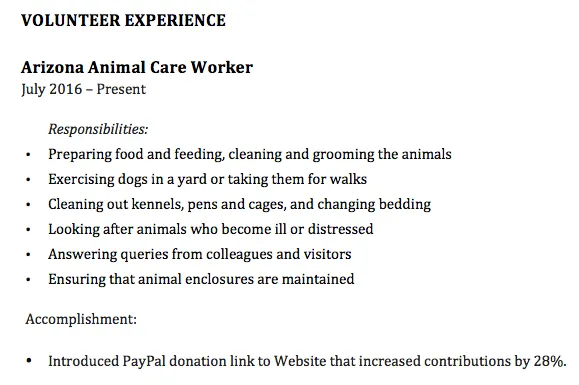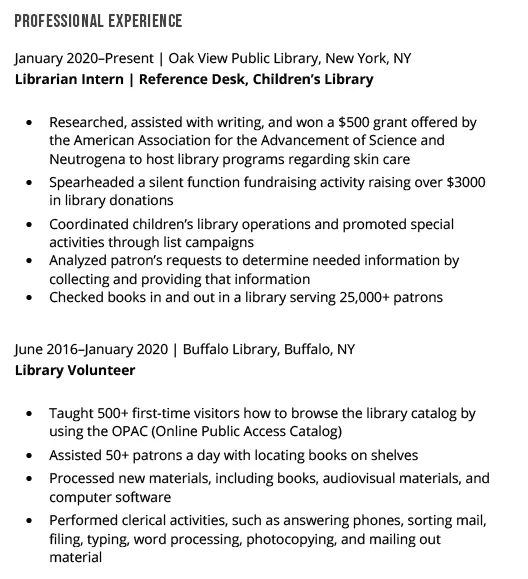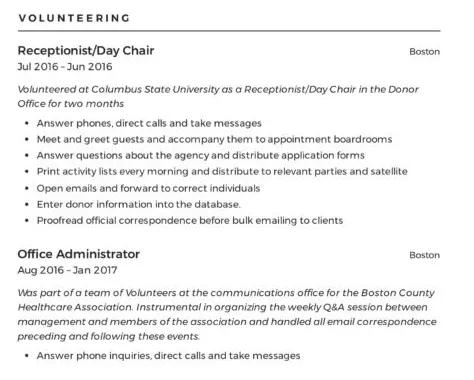You only have one chance to make a good first impression, and with resumes, you get a single page of content to do it. For this reason, you want to ensure that every piece of information on it, including the details about your volunteer experience, portrays you as a capable and active person.
It’s hard to find a better way to show your ambition and competence than to list volunteer work that shows how you go above and beyond the call of duty.
Still, it’s worth noting that such sections don’t fit every resume. For that reason, we’ve created this handy guide to help you know when you should include such activities in your resume and what the best way to do that is. Let’s jump in!
Key Takeaways
Volunteer experience is an optional section for your resume that’s a powerful supplement to your professional history.
Add volunteer experience to your resume when it’s a part of the company’s culture, a substitute for relevant work experience, or if it’s highly related to the position you’re applying for.
Consider leaving this section out if the volunteering experience happened a long time ago or was completely unrelated to the job you’re applying for, as well as if you have enough work experience to showcase.
Keep the contents relevant, emphasize your achievements, and adjust the section’s length to fit your resume.
What is the Volunteer Experience Resume Section?

The volunteer experience section is in many ways similar to the work experience one, as it shows your competence and efficiency in a real-life environment. Moreover, you can also use it to make some of your important skills more prominent. It's even formatted and presented on your resume in the same way as your work history section.
Nevertheless, it should not be a replacement for your professional history. Neither should it be the main focus of your application, taking attention away from the main sections. In most cases, it’s most effective when its role is supplemental.
All of it makes this part tricky to pull off, which is why only 30% of applicants include it on their resumes. Yet, 82% of employers prefer to see it. So, simply knowing how, when, and where to add volunteer experience to your resume already puts you in the top third of job hunters.
Should You Include Volunteer Experience on Your Resume?
Volunteer experience is an optional section. As such, its importance depends on various factors—it can go from being irrelevant to adding tremendous value to your resume. So, we put together a list of situations when you should include or omit volunteer experience on your resume. It will help you figure out the best course of action for your job application.
When To Include Volunteer Experience
You should make sure to add the volunteer experience section to your resume if:
It’s a part of the company’s culture. The most obvious example of this would be applying for a job in the nonprofit sector. This is where you’d want to highlight your volunteer experience, as it presents you as a person who strives to make a difference and make a real change in the world.
You don’t have relevant work experience. If you’re new to the industry as a recent graduate or someone who changed careers, you likely don’t have a lot of professional experience. In that case, relevant volunteer work is one of the best replacements for it.
Volunteer experience is highly related to the job posting. For example, say you ran a successful social media campaign that helped local dog shelters with fundraising. That would be an impressive example of volunteer work for a resume of a social media manager.
When Not To Include Volunteer Experience
On the other hand, here are the occasions when you should avoid mentioning your volunteer work:
Volunteer experience happened a long time ago, which makes it outdated. A good resume is all about relevance and recency. That’s why one of the best formats for resumes is the reverse-chronological one. The first volunteer experience you had, which happened ten years ago, probably isn't relevant in the current professional climate.
You have a rich professional history, which leaves no space for volunteer experience and similar sections. In general, employers are first going to look at your career history and job-specific skills. Only after those sections satisfy their requirements will they check the optional parts of your resume.
Volunteer experience is completely unrelated to the job position you’re applying for. Even if you have enough space on your resume after including everything related to your paid work endeavors, don’t add a volunteer section for the sake of it. There are other optional but also important sections you can include, such as languages, awards, honors, hobbies, or interests.
How to Write Volunteer Experience on a Resume
You can add volunteer experience to your resume as:
Part of your work experience
A stand-alone section
Use the first method if that experience forms part of your professional career and is highly related to the job position you’re applying for. In that case, mention it in a bullet point under the related job position in your work experience section.
On the other hand, if your volunteering wasn’t directly connected to one of your previous jobs, you can make it truly stand out by creating a separate section for it. It would be even better if you could partially match your experience to the job description and highlight your relevant skills and accomplishments.
As previously mentioned, in that case, you want your volunteer experience section to look like your work history one. That’s why, besides using the same font, format, and spacing as in your work history, your volunteer section should present similar information. Here are the essential bits:
Mandatory Volunteer Experience Information
Name of the volunteering position
Name of the program or organization you volunteered for and its location
Dates of volunteer work
Responsibilities, results, and accomplishments within the role
Examples of Volunteer Experience on a Resume
Let’s take a look at a properly formatted and information-rich volunteer experience example for students:
Student Volunteer Experience Section Example
VOLUNTEER EXPERIENCE
Fundraising Project Lead (Oct 2019–Jan 2020) PI SIGMA EPSILON - Roosevelt University, Chicago, IL
Managed a 12-person team to form and execute a marketing plan to sell university-branded caps, t-shirts, and hooded sweatshirts at $17, $19, and $37, respectively.
Created social media posts and ran campaigns on Facebook and Instagram to reach the target audience.
Reached a $1,700 sales goal within three months while being personally responsible for more than 60 articles sold.
Take note of how the candidate listed all of their duties and accomplishments, highlighting their competence. Additionally, they used exact numbers to further quantify the results and make this section stand out. All of that makes this the perfect section for someone applying for a position in marketing.
Now, let’s take a look at a poorly written volunteer experience example:
Bad Example
Volunteer Shop Assistant
Handled all of the shop’s duties, from till reconciliation to stock-taking.
This section lacks even the most basic information, which makes it too vague. As a result, it doesn’t showcase the applicant’s abilities and achievements in any meaningful way.
Helpful Tips for Adding Volunteer Experience to Your Resume
Adding volunteer experience to your resume isn’t a difficult endeavor. Still, if you want to get the most out of it while avoiding mistakes, you’ll greatly benefit from the following tips:
Tip #1. Keep it Relevant
We’ve already touched on the importance of relevance in resume building. The purpose of your application is to show that you’re the right person for the job, and that’s why every bit of information needs to go in that direction.
Any type of volunteer work added to your resume portrays you as a passionate and enthusiastic person. These are all traits that recruiters look for in candidates. Nevertheless, if you want your volunteering to have the biggest impact on hiring managers, it needs to be relevant to the position you’re applying for.
Tip #2. Use the Right Format
Proper, uniform formatting is another crucial aspect of resume creation. It makes your resume look captivating and professional. On a functional level, that improves readability and helps your resume pass the ATS scan more easily.
Another reason to use the right format is to ensure that you’ve included all the important information. Even the absence of seemingly insignificant details, such as the dates of your volunteer work or the location of the organization you volunteered for, can make this section appear less prominent.
Tip #3. Emphasize Achievements
The best way to showcase your skills and proficiency is by emphasizing actual results. If you want to capitalize on your volunteer experience fully, focus on your achievements and be as specific as possible.
One of the best ways to do that is to include exact numbers and percentages in combination with action verbs and power words.
Numbers allow hiring managers to measure your competence, which is much better than leaving them to go off of ambiguous information.
Strong action verbs and power words are creative replacements for the usual, overused terms. They make your volunteer experience much more captivating and memorable. For example, the next time you want to say that you “started” a project, use the term "spearheaded" instead.
Tip #4. Keep Resume Length in Mind
Even though volunteer experience can be a highly valuable resume section, it’s still optional. That’s why you should adjust its length depending on the rest of the resume’s content.
Whenever possible, the main focus of your resume should be on work experience along with your skills and education. Volunteer experience and other optional sections come after that. If you have an extensive employment history to showcase, you’d want to keep this section brief and concise.
What Are the Benefits of Listing Volunteer Experience?

One of the main benefits of adding volunteer experience to your resume is that it further highlights your abilities and proficiency. Some of the easiest skills to highlight are leadership, teamwork, and organizational skills. This section becomes even more effective if your volunteer work is related to your professional career, allowing you to display position-specific hard skills.
But the benefits of putting this section on your resume go beyond showing off your efficiency in a job-related field. There’s a hidden meaning behind volunteer experience, which reveals three things about you:
Hidden Meaning Behind Volunteer Experience
You are a compassionate and well-rounded individual.
You have more skills than are required to do your job.
You can help the company build a better reputation.
For all these reasons, a stunning 85% of hiring managers are willing to look past mistakes on your resume if it shows that you have done volunteer work. They think that volunteering is a good way to improve leadership abilities and gain more skills overall. In the end, they are much more likely to pick an applicant with volunteer experience rather than choosing someone with a richer work history.
Volunteer Experience Examples
To gain a better understanding of what volunteer experience should look like on your resume and what benefits it brings, let’s take a look at some of the examples.
#1. Volunteer experience 1

Here’s an information-packed volunteer experience section. This one is perfect for candidates who have fewer career-specific accomplishments to showcase.
Adding a list of responsibilities highlights the applicant’s efficiency and trustworthiness. The candidate also included an impressive accomplishment and used an exact number to make it more tangible.
#2. Volunteer experience 2

Volunteer experience has been included here as part of the candidate’s professional experience. They cleverly linked the two to show how their volunteer work helped them gain skills and experience that were useful during their internship.
Notice how they used a reverse-chronological format to give recruiters a better view of their career progress. They also provided a long list of duties and accomplishments while using numbers and action verbs throughout. All of that made for a powerful section and an incredibly strong resume, even though they are applying for an entry-level position.
#3. Volunteer experience 3

Here we have another example of a well-thought-out and thorough volunteer section. The candidate created a detailed bullet point list with all of their important responsibilities. Through it, they highlighted plenty of administration-related hard skills.
They also indirectly showcased communication skills, organization skills, attention to detail, and several other highly sought-after soft skills.
#4. Volunteer experience 4

Finally, here’s an example of a modest but still strong volunteer experience section, perfect for candidates who don’t have a lot of room on their resumes.
Volunteer Experience FAQ
Here are the most frequently asked questions about volunteer work on a resume and the answers:
#1. What makes a good volunteer experience?
A good volunteer experience shows that you’re selfless, humane, hardworking, and motivated while also highlighting your leadership and organizational skills. Also, it’s even better for your job application if your volunteer work relates to your professional career.
#2. How do I write about my volunteering experience?
Format your volunteer experience like your work history section. Include all the essential information, such as:
Volunteer Experience Section Format
Your role
Organization and its location
Dates
Responsibilities and achievements
This section is optional and, therefore, highly flexible. If there’s more space on your resume, be more detailed and include as much relevant information as you can. If space is limited, keep it brief and concise.
#3. Is volunteer experience important to recruiters?
82% of hiring managers say they are more likely to choose someone with volunteer experience. On the contrary, only 30% of resumes feature this section. That makes it all the more important and gives you the option to get a head start right off the bat.
Closing Thoughts
Volunteer experience is still a hidden gem in the world of resume building. The majority of applicants have no idea that hiring managers love to see this section on their resumes and that it’s one of the easiest ways to get ahead of the competition.
This article gives you all the guidelines, tips, and tricks you need to make the perfect section for your volunteer work on your resume. That will help you grab recruiters’ attention and land that dream job without breaking a sweat. Good luck!


